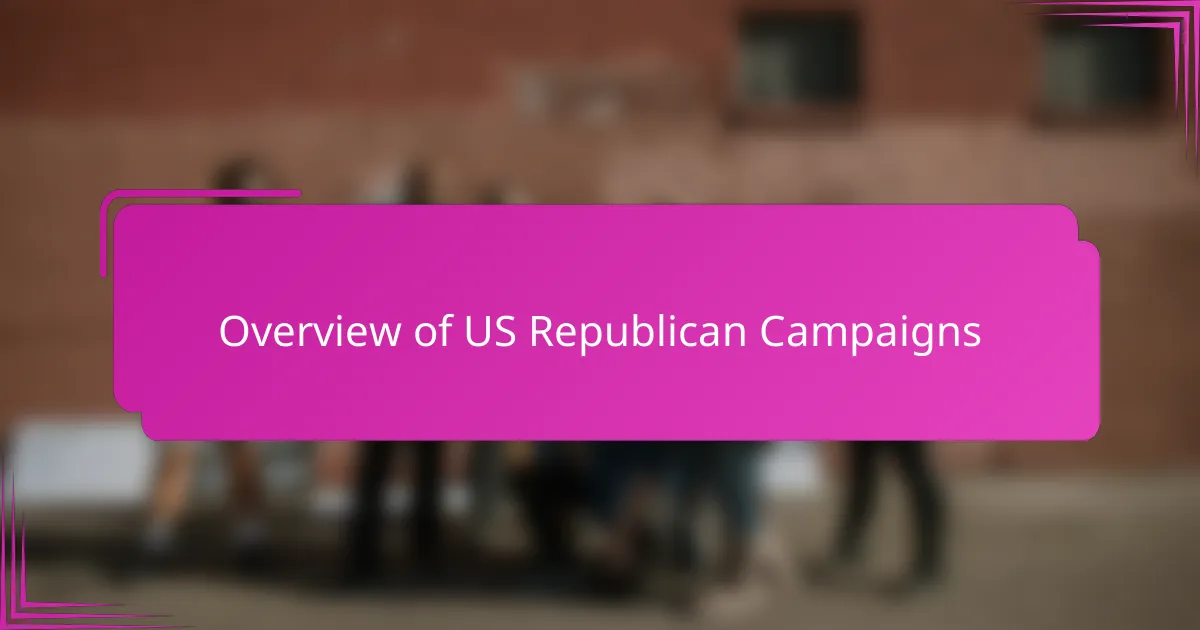Key takeaways
- Event sponsorship in politics is a strategic partnership that aligns sponsors with a candidate’s vision, influencing the overall campaign narrative.
- Sponsorships significantly impact campaign credibility, showcasing community support and enhancing voter trust.
- Types of sponsorships vary, with title sponsors taking prominent roles, and successful collaborations creating a collective message that amplifies the campaign’s reach.
- Choosing the right sponsors requires alignment of values and a focus on long-term relationships rather than just financial contributions.

Understanding Event Sponsorship in Politics
When I first got involved in Republican campaigns, I quickly realized that event sponsorship is more than just a financial transaction—it’s a strategic partnership. Sponsors aren’t just funding events; they’re aligning themselves with a candidate’s vision and values. Have you ever thought about how much influence these sponsors wield behind the scenes?
From my experience, understanding the nuances of event sponsorship means recognizing the delicate balance between raising funds and maintaining authenticity. It’s emotional because these events are often a reflection of grassroots support, yet at the same time, they depend on larger donors to scale impact. This tension makes navigating sponsorships both challenging and fascinating.
What I find most compelling is how sponsorships can shape the political narrative before a single speech is made. Knowing who backs an event can reveal the underlying priorities and power structures at play. Don’t you think that adds another layer of strategy to campaign planning?

Overview of US Republican Campaigns
US Republican campaigns have always struck me as a blend of tradition and adaptation. They lean heavily on a solid grassroots network, yet they constantly evolve to capture new voter bases. It’s interesting how this duality keeps the party energized while staying rooted in its core principles.
I remember attending one campaign rally where the energy was palpable—people united by a shared vision and hope. But behind that enthusiasm, there was a meticulous strategy steering every move, every message. Have you ever noticed how even the smallest events can reflect a larger campaign blueprint?
Campaigns today also rely heavily on diverse outreach—from door-to-door canvassing to social media blitzes. Balancing these methods feels like walking a tightrope, trying to engage traditional Republicans without alienating younger or more moderate voters. It makes me wonder how much every tactic is scrutinized before it even sees the light of day.

Importance of Sponsorship for Campaigns
Sponsorships are the lifeblood of many Republican campaigns I’ve witnessed. Without that crucial financial and logistical backing, events often struggle to gain traction or reach wider audiences. Have you ever thought about what it takes to move from a local meet-and-greet to a large-scale rally? That leap usually depends on the right sponsors stepping up.
From my perspective, sponsorships do more than just fill coffers—they build credibility. When respected businesses or influential individuals endorse a candidate through event sponsorship, it sends a message of trust and stability to voters. I’ve seen firsthand how this can energize supporters and even sway undecided attendees by showcasing a network of assured backing.
Yet, there’s an emotional layer for me here. Campaigns are a collective effort, and sponsorship signals that a candidate’s message resonates beyond just the individual—there’s a community standing behind them. Doesn’t that feeling of shared belief make the event itself more powerful and authentic? It’s that connection between sponsor, candidate, and voter that truly underscores the importance of sponsorship in electoral success.

Types of Sponsorship Opportunities
When I first navigated event sponsorship in Republican campaigns, I noticed there are several distinct types: title sponsors who take center stage in branding, supporting sponsors who contribute significantly but share the spotlight, and in-kind sponsors providing goods or services instead of cash. Each type brings a different kind of energy and expectation to the event, shaping the campaign’s reach in unique ways. Have you ever wondered how a simple logo placement can actually influence the mood and message of a political gathering?
Sponsorship levels often reflect the investment and involvement a backer is willing to make. For example, a title sponsor might have exclusive naming rights, which speaks volumes about their commitment and influence, while smaller sponsors quietly add essential support behind the scenes. From what I’ve seen, understanding these layers helps in tailoring relationships; it’s not just about dollars, but about meaningful engagement that respects everyone’s role.
One memory that sticks with me is an event where multiple sponsors came together, each bringing a piece of the puzzle—some with financing, others with volunteer networks or media connections. That synergy created an atmosphere where the candidate’s message felt amplified, almost like a chorus rather than a solo. Don’t you think that when sponsorships align well, it transforms the whole event into something bigger than the sum of its parts?

Evaluating Sponsorship Benefits
Evaluating sponsorship benefits goes beyond just tallying dollars—it’s about understanding the real impact sponsors bring to an event. I’ve often found that the value lies in how a sponsor’s reputation meshes with the campaign’s values. Does their involvement strengthen the candidate’s image, or could it muddy the message? This alignment can either boost credibility or raise eyebrows among attendees.
What I think makes evaluation tricky is measuring intangible benefits like expanded networks or heightened media attention. I recall one event where a sponsor’s connections opened doors to influential community leaders, turning a routine fundraiser into a gateway for future endorsements. Isn’t that kind of ripple effect what makes some sponsorships truly priceless?
Of course, practical considerations matter too—logistics, branding opportunities, and explicit perks like speaking slots. From my experience, balancing these tangible elements with the softer, strategic gains requires a nuanced approach. How much weight should a campaign place on immediate visibility versus long-term relationship building? Weighing these factors carefully can shape a sponsorship into a powerhouse for campaign momentum.

Personal Experience with Sponsorship
One of my earliest experiences with event sponsorship taught me how personal these partnerships can feel. I remember a local business owner stepping forward to sponsor a community meet-and-greet. It wasn’t just about their logo on a banner—it felt like they genuinely believed in the candidate’s message, and that belief energized everyone involved. Have you ever encountered sponsorships that seem to carry a personal story behind the financial support?
At another event, the impact of a strategic sponsor became crystal clear to me. Their support wasn’t just funding; it was a signal to voters that the campaign had solid backing and serious momentum. That kind of sponsorship added a layer of legitimacy, which I found crucial in shaping attendees’ perceptions even before a word was spoken. I often wonder how much that initial impression influences long-term voter support.
Sometimes, the emotional side of sponsorship hits me unexpectedly. During a campaign event, seeing multiple sponsors unite in their support created a powerful sense of community. It reminded me that sponsorships are more than transactions—they’re expressions of shared hope and commitment. Doesn’t that communal spirit make the event feel more authentic and inspiring?

Tips for Choosing Sponsorships
Choosing the right sponsorships means more than just picking whoever offers the most money. From my experience, it’s crucial to align the sponsor’s values with the campaign’s core message. Have you ever noticed how a mismatched sponsor can create silent tension at an event? When the partnership feels authentic, it strengthens both the candidate’s image and voter trust.
I also think about how the scale of a sponsor’s involvement influences the event’s atmosphere. For example, a title sponsor with exclusive branding rights can set the tone, but too much dominance might overshadow the candidate’s voice. Finding that sweet spot requires a careful balance, one I’ve learned comes from understanding the sponsor’s long-term commitment, not just their initial investment.
Another tip I swear by is looking beyond immediate perks like logo placement or speaking slots. Sometimes, the real value lies in what a sponsor brings to the table behind the scenes—networks, volunteer enthusiasm, or media access. Have you ever been at an event where a sponsor’s influence quietly shifted the energy and outreach? Those moments reaffirm why choosing sponsorships thoughtfully is so essential for campaign success.